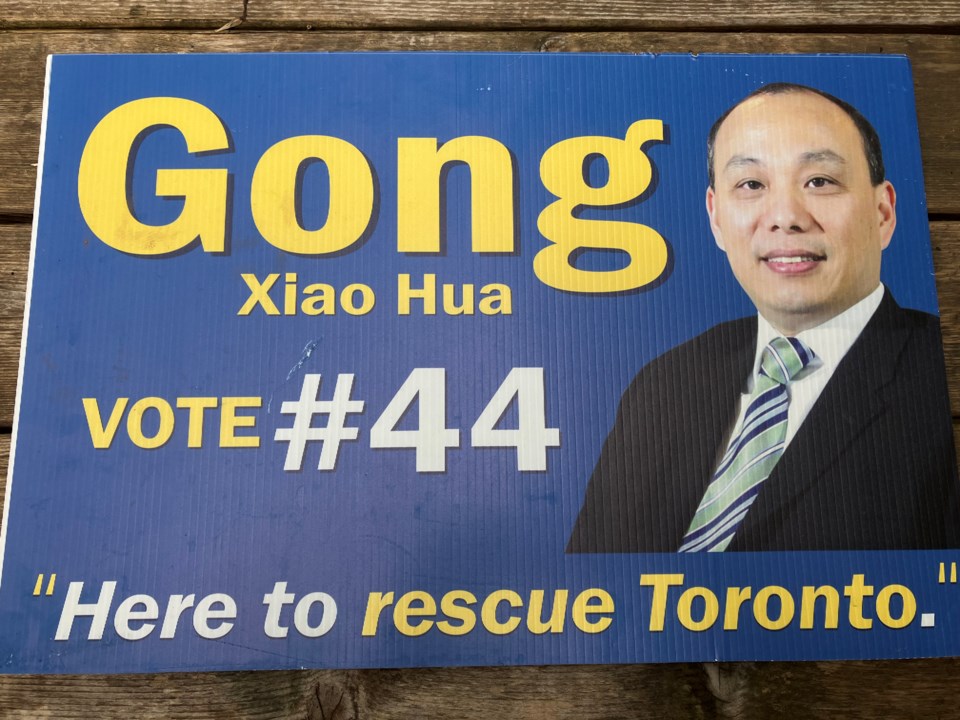Toronto mayoral candidate Xiao Hua Gong spent $231.12 per vote in the local byelection that followed the resignation of former mayor John Tory, campaign finance disclosures show.
Gong's total campaign income was $696,735, of which he spent $689,443. About $400,000 of that was spent on advertising other than signs,
On polling day, Gong came 11th, with 2,983 votes out of 724,638 cast, or about 0.4 per cent of the total.
By contrast, winner Olivia Chow spent $5.82 per vote, and second-place finisher Ana Bailao spent $9.05.
Gong's campaign did not respond to a request for comment.
Campaign finance expert Robert MacDermid, a retired York University political science professor, called Gong's financial disclosure "one of the most unusual ones I've ever seen."
"This is a very unusual campaign finance return, with all sorts of strange totals that don't at all accord with the practice of normal campaigns."
Although Gong's donor data shows many large donations — 56 per cent at the maximum $2,500 level, and 71 per cent at or over $2,000 — the return shows nothing at all spent on fundraising activities. By contrast, Bailao's return shows about $420,000 spent on a series of fundraising lunches, dinners and receptions during the campaign.
"It's bizarre," MacDermid said of the Gong return.
"Obviously, the most efficient way to raise funds is to go to wealthy people and do that sort of thing. Normally, you get them all in a room. There's some expense obviously involved: you have some venue and you invite people and they come.
"It's very strange that there are no fundraising costs or event costs: that's kind of amazing."
Less than 10 per cent of Gong's donors gave less than $1,000.
Over half of the donors list addresses in the 905 area code.
MacDermid also pointed to the small amount of money the campaign spent on salaries: $26,682 as opposed to $318,372 for Bailao and $348,328 for Chow.
There are two ways to handle the more labour-intensive aspects of campaigning, like installing lawn signs or distributing leaflets he explains: people can be paid to do it, or campaign volunteers can do it out of enthusiasm for the candidate.
The very low number of donors in general in Gong's data (339, as opposed to 1,387 for Bailao and 4,547 for Chow) and the shortage of low-dollar-amount donors, imply a very small volunteer base.
The salaries are too small to pay people to, for example, hand out the leaflets his disclosure says he spent $65,540 on and travel around the city hammering in $123,406 worth of signs, which raises questions that are not easily answered, MacDermid said.
The return also shows five donors at an obviously fictitious address of "1 Unknown St., Toronto, ON, M1M 1M1."
M1M 1M1 actually does exist as a Toronto postal code, on the south side of Kingston Road near Markham Road in Scarborough. 1 Unknown St, of course, does not.
"Obviously that's a violation of the campaign reporting rules that you would think the person who was doing the audit would have picked up," MacDermid said. "That's an obvious, obvious omission."
Fundraising details for many mayoral campaigns were released Monday, including Chow, Bailao and fifth-place finisher Josh Matlow. The Mark Saunders and Anthony Furey campaigns said they had paid a $500 fee for an extension to October 11. Neither campaign would say why they felt they needed an extension.
In 2021, Gong agreed to forfeit more than $60,000 to the New Zealand government under that country's proceeds-of-crime law. New Zealand police said at the time that it was the largest forfeiture yet under the law, passed in 2009.
“This outcome sends a simple message to criminals around the world — send your dirty money to New Zealand and you will lose it,” Detective Inspector Craig Hamilton was quoted as saying at the time.
Hamilton described the case as involving "complex multi-jurisdictional money laundering at the most serious level."
An Ontario Securities Commission case against Gong, in which it alleges that he committed securities fraud and sold securities without being registered, is ongoing. A corporation that Gong controlled previously pleaded guilty to criminal charges in court relating to the same activities, the OSC says.
MacDermid remains puzzled by the campaign. Gong had no prior background in politics at any level and was otherwise more or less unknown to the general public.
"No one who was experienced in politics or even inexperienced in politics could possibly imagine that they could win. So what was this all about? I don't have an immediate answer to that.
"This is a case where there was no kind of turning money into votes, which is kind of mystifying."



